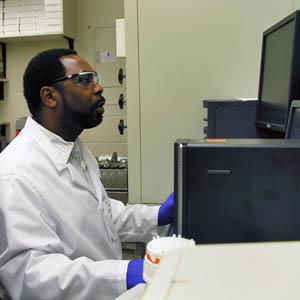Meet EPA Scientist Swinburne A.J. (Jason) Augustine, Ph.D.

Measuring Exposures to Environmental Pathogens
Dr. Swinburne A. J. Augustine (Jason), Ph.D. is an EPA Research Microbiologist/Immunologist. His research is aimed at developing and applying rapid, cost-effective and multiplexed immunoassays to determine and/or measure human exposures to environmental pathogens using antibodies in human saliva as biomarkers of exposure. He is a member of the American Association of Immunologists and the American Society for Microbiology. Dr. Augustine also served in the U.S. Army.
How does your science matter?
Every day, we are exposed to a myriad of harmful environmental (airborne, food-borne, and waterborne) organisms. Sometimes they make us sick but more often than not, our immune system protects us from these pathogens. My research uses antibodies in human saliva to measure levels of exposure to environmental pathogens. Epidemiologists use this data to determine if the levels of exposure are high enough to be harmful to humans. This information helps inform Agency decisions on what measures should be taken to protect human health. My research partners and I are analyzing multiple pathogens simultaneously, which saves EPA time and money.
If you could have dinner with any scientist, past or present, who would it be and what would you like to ask them about?
I'd like to have dinner with Antonie Van Leeuwenhoek. I'd ask him what inspired him to invent the microscope and what is the secret to its construction?
What do you like most about your research?
I really enjoy the collaboration with a range of scientists including epidemiologists, virologists, microbiologists, immunologists and engineers. We work together to tackle tough water quality, sustainability and exposure questions in order to ensure the protection of public health and the environment.
When did you first know you wanted to pursue science?
I'd been curious about how life "worked" from a very young age but experimented with several non-scientific professions first. After completing my tour of active duty in the U.S. Army in 1996, I returned to college. I had already worked as a nurse for 14 years and had determined that I did not want to be a physician. I excelled in the sciences and decided to pursue a Ph.D. in Biomedical Sciences after a long talk with my undergraduate Microbiology Chair and mentor, Dr. Ann Fuqua.

Tell us about your science/educational background.
I obtained a Bachelor of Science Degree in Biology/Chemistry from Trevecca Nazarene University in Nashville, TN and my Ph.D. degree from Meharry Medical College, which is also in Nashville. My doctoral thesis focused on understanding the host cell infection mechanisms of the protozoan Trypanosoma cruzi—responsible for Chagas disease.
- Parasites - American Trypanosomiasis (also known as Chagas Disease)
What brought you to EPA?
I've always been attracted to public service. Upon completion of my doctoral program, I began looking at government research agencies. I went to the EPA website and found a post-doctoral opportunity that I was very interested in pursuing. I got the position and thoroughly enjoyed the experience. I joined the full-time staff of EPA six months later.
If you were not a scientist, what do you think you would be doing?
I would have continued my military service or returned to journalism as a news reporter.
Any advice for students considering a career in science?
Scientific inquiry may not be glamorous. The work is usually hard and painstakingly meticulous, but the rewards are enormous. In no other profession can one make a global impact as in science!
We really do the work of "understanding" life. There are many pathways to success in the sciences: academia, industry or government. You must find your niche; something that makes you happy and pursue it with all you've got. Finally, and most importantly, find a good mentor who will guide you throughout your career.
